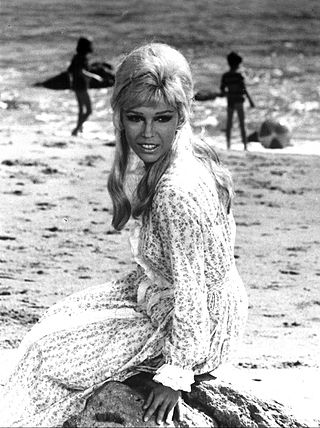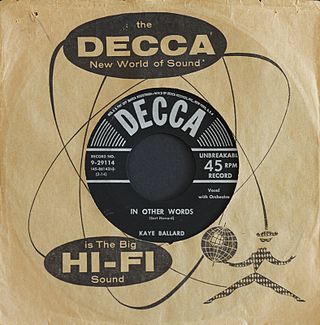
Nancy Sandra Sinatra is an American singer-songwriter, actress, film producer and author. She is the elder daughter of Frank Sinatra and Nancy Sinatra and is known for her 1965 signature hit "These Boots Are Made for Walkin'".

"Fly Me to the Moon", originally titled "In Other Words", is a song written in 1954 by Bart Howard. The first recording of the song was made in 1954 by Kaye Ballard. Frank Sinatra's 1964 version was closely associated with the Apollo missions to the Moon.
Gordon Hill Jenkins was an American arranger, composer, and pianist who was influential in popular music in the 1940s and 1950s. Jenkins worked with The Andrews Sisters, Johnny Cash, The Weavers, Frank Sinatra, Louis Armstrong, Judy Garland, Nat King Cole, Billie Holiday, Harry Nilsson, Peggy Lee and Ella Fitzgerald.
"My Heart Cries for You" is a popular song, adapted by Carl Sigman and Percy Faith from an 18th-century French melody. The song has been recorded by many singers, the most successful of which was recorded by Guy Mitchell which reached No. 2 on the Billboard chart in 1951.

Annette May Tucker is an American songwriter, who found success in the 1960s as co-writer of songs for The Electric Prunes, The Brogues, The Knickerbockers, Nancy and Frank Sinatra and others.

"Oh No Not My Baby" is a song written by Gerry Goffin and Carole King. The song's lyrics describe how friends and family repeatedly warn the singer about a partner's infidelities. The song is regarded as an American standard due to its long-time popularity with both music listeners and recording artists.
"The Sun Ain't Gonna Shine (Anymore)" is a song written by Bob Crewe and Bob Gaudio.

"It's in His Kiss" is a song written and composed by Rudy Clark. It was first released as a single in 1963 by Merry Clayton that did not chart. The song was made a hit a year later when recorded by Betty Everett, who hit No. 1 on the Cashbox magazine R&B charts with it in 1964. Recorded by dozens of artists and groups around the world in the decades since, the song became an international hit once again when covered by Cher in 1990.

"Bang Bang (My Baby Shot Me Down)" is the second single by American singer-actress Cher from her second album, The Sonny Side of Chér (1966). It was written by her husband Sonny Bono and released in 1966. It reached No. 3 in the UK Singles Chart and No. 2 on the Billboard Hot 100 for a week (behind "(You're My) Soul and Inspiration" by The Righteous Brothers), eventually becoming one of Cher's biggest-selling singles of the 1960s.
"Softly, as I Leave You" is a popular Italian song, originally titled Piano, composed by Tony De Vita with Italian lyrics by Giorgio Calabrese, and English lyrics by Hal Shaper.
"You're Nobody till Somebody Loves You" is a popular song written by Russ Morgan, Larry Stock, and James Cavanaugh and published in 1944. The song was first recorded by Morgan and was a hit for him in 1946, reaching the No. 14 spot in the charts. The best known version was Dean Martin's, which was released in 1960 and reissued in 1964.
"Let's Fall in Love" is a song written by Harold Arlen (music) and Ted Koehler (lyrics) for the film Let's Fall in Love and published in 1933. In the film, it is heard during the opening credits and later sung by Art Jarrett and chorus, and by Ann Sothern.

I'd Rather Believe in You is the thirteenth studio album by American singer-actress Cher, released in September 1976 by Warner Bros. Records. This album was a commercial failure and failed to chart.

"You Better Sit Down Kids" is a major hit single by American singer/actress Cher in 1967 from her fourth studio album With Love, Chér, released in November 1967 by Imperial Records. The song was written by her then-husband Sonny Bono. Sung from a father's perspective, the lyrics tell the story of a divorce as explained to the couple's children. The song is featured on the compilation albums Cher's Golden Greats (1968), Superpack Vol. 1 (1972) and Gold (2005).

All I Ever Need Is You is the fourth studio album by American pop duo Sonny & Cher, released in 1972 by Kapp/MCA Records. The album reached number 14 on the Billboard 200 and was certified gold for the sales of 500,000 copies.

"I Know (You Don't Love Me No More)" is an R&B song written and recorded by American singer Barbara George, released as her debut single in 1961. It became her signature song and her only major hit in United States, reaching No.1 on the Billboard R&B singles chart and No.3 in the Hot 100. It was later covered by various artists, inducing Fats Domino, Cher, Ike & Tina Turner, and Bonnie Raitt. A Spanish version by Marisela topped Billboard's Latin chart in 1988. The Shirelles borrowed the melody of "I Know" for their 1963 cover of "Everybody Loves A Lover".

"Leave Me Alone " is a 1973 song written and first recorded by American singer-songwriter Linda Laurie. It was famously covered by Australian-American singer Helen Reddy several months later; Reddy's cover was a million-selling, Gold-certified hit single.

"Want U Back" is a song by English singer Cher Lloyd from her debut studio album, Sticks and Stones (2011). It was released as the third single from the album on 3 February 2012, and it was released as the lead single from the US version of the album on 22 May 2012. The UK single release features guest vocals from The X Factor US contestant Astro. In the United States, the song was released as a solo single, without Astro's verses. Its remix features Snoop Dogg. The song was written by Savan Kotecha and Shellback, with production being handled by the latter. Musically, "Want U Back" is a pop song, with elements of bubblegum and synth-pop, while lyrically the song is about a girl who's jealous of her ex-boyfriend's new relationship, and tries to sabotage the new relationship.

"The Greatest Love of All" is a song written by Michael Masser, who composed the music, and Linda Creed, who wrote the lyrics. It was originally recorded in 1977 by George Benson, who made the song a substantial hit, peaking at number two on the US Hot Soul Singles chart that year, the first R&B chart top-ten hit for Arista Records. The song was written and recorded to be the main theme of the 1977 film The Greatest, a biopic of the boxer Muhammad Ali, and is performed during the opening credits.

"Didn't We" is a song recorded by Irish singer and actor Richard Harris for his debut studio album, A Tramp Shining (1968). It was written and produced by Jimmy Webb and originally served as the B-side to Harris' 1968 single "MacArthur Park". "Didn't We" was then distributed as the record's single by Dunhill Records, also in 1968. A traditional pop song, Harris sings about his life in the past. Commercially, it charted at lower positions of both the United States and Canada, and in the higher ranks of their Adult Contemporary component charts. Harris featured "Didn't We" on several of his greatest hits albums, including The Richard Harris Collection: His Greatest Performances from 1973. That same year, the song was reissued as a promotional single paired alongside his 1971 single "My Boy".













